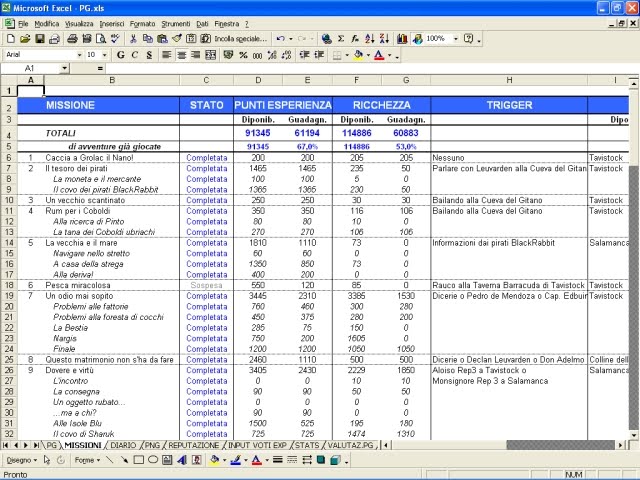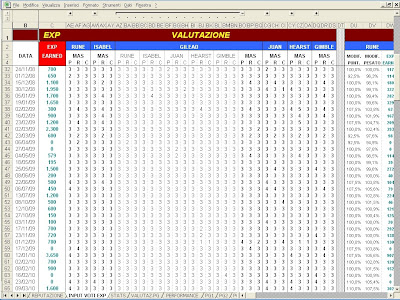APPLICAZIONE DELLA NORMA - CAP.8: MISURAZIONE, ANALISI E MIGLIORAMENTO; SODDISFAZIONE (pt.1) We arrived at the thicker section of this paper. The question is: how do I improve if I want to know * what * I need to improve?
The answer is deceptively simple: I must act on what is not right for my clients (ie the game). To do this I have to "measure" satisfaction, but not all. I must also measure the other processes that I consider fundamental to understand the performance of the group in order to create indicators that are assessed. There are no
indicators "universal." Each group can establish its own, or can not determine at all.
The advantage of indicators is that they can take decisions based on data collected in a systematic way, and not on feelings or impressions.
not to leave too smoky to the question, I propose the following history of the monitoring systems that I introduced in my group of D & D.
Everything is born of two parallel demands: first, purely by Master, to have a statistical control to balance the progress, the second, more complex, to encourage improvement in the way of playing by all.
registry statistics progression and advancement The first need I have previously presented the Register of progression. This instrument has proved useful for monitoring over time in a statistical progress of the group. Look at the screenshot below.

Focus on percentages above: it can be seen in the progression, the PCs have accounted for 67% of experience points available in various adventures, and have recovered 53% of the treasure.
These considerations, emerged just after the first sessions, have been consolidated over time and represent an improvement on my part as master planning. When preparing an adventure, can roughly predict what is the progression of the characters in its development, and acquired wealth. In this way I can more easily maintain the pace of progress at the level that I charge, including in planning an appropriate amount of experience and wealth.
The evaluation system The second requirement was, however, less easy to monitor.
In my previous campaigns had introduced "incentives" to encourage players to engage in the interpretation of their characters. Incentives based on percentage change to apply to experience points according to my discretion DM. A system that is nothing new, even in the network can trovare molti esempi.
Giusto per dare un minimo di indicazioni, il mio sistema prevede un giudizio al termine di ogni sessione sulla base di 3 parametri e su una scala di 5 voti. L’assegnazione dei Punti Esperienza ha luogo all’inizio della sessione successiva, in modo da avere tutto il tempo per fare calcoli e pensate sulla partita trascorsa.
I parametri valutabili sono:
- "P" = Partecipazione (quanto il personaggio abbia interagito nell'avventura rispetto a quanto è richiesto per un personaggio di quella classe)
- "R" = Ruolo (interpretazione, caratterizzazione, ma soprattutto congruenza con il carattere, il background e l'allinemaento scelti)
- "C" = Comportamento (educazione del giocatore, rispetto degli altri, capacità di rovinare un'atmosfera con uscite idiote, disturbo in partita, rispetto delle regole, tentativi di barare, ritorsioni extra-partita tra giocatori e ogni altra nefandezza vi venga in mente).
Ogni parametro viene valutato secondo le seguenti scale di valori che applicano una penalità/bonus ai Punti Esperienza (le percentuali sono ovviamente a discrezione di quale peso si vuol dare alla valutazione delle performance)

La tabella si spiega da sé, ma ci tengo a fare una sola precisazione. Il parametro di comportamento ha solitamente solo una connotazione negativa. Un giocatore che si comporta bene in partita non merita un “buono” or "excellent, good behavior should be the norm!
usually assigned the highest ratings in behavior only if a player is correct to the group when, for reasons of plot can not play actively for long periods (eg, his character is far away because he is traveling), but still participates in meetings without interfering. Or when a player does not respond to provocation at issue in another player with whom he might have had disagreements out of the game, bringing attention to the game without the Master must intervene to calm tempers.
Returning to a general context, it is clear that a system of awards of this type can be created and adapted for those game systems that provide a feed (this is experience, skill points, etc.).
I am more than sure many of you have used or are using something similar.
However, I'm curious to know how many of you then actually get the desired result.
Not that the idea of \u200b\u200bincentive / punishment is wrong, anything, but if you focus on the act of judging, players often see the evaluation by the DM as a "punishment undeniable," Some believe that the EC 'you have with them, others think that the findings can only be positive and do not take a punitive rate. In addition, the modifiers in the game can not be too great, otherwise the risk is quello di rendere gli incentivi più importanti dei premi di base!
Il risultato è che l'incentivo a far meglio è basso, e spesso la valutazione viene vissuta come un momento negativo e forzato in cui il Master si lamenta e dice la sua, in cui il suo "cocco" prende i bonus e gli altri no, e poi superato questo consueto strazio si comincia finalmente a giocare.
Il problema di questo sistema di valutazione è l’unidirezionalità. Il giudizio è calato "dall’alto" secondo la percezione del Master. Con il tempo mi sono accorto che spesso la mia percezione non necessariamente coincide con quella dei giocatori.
Se trasponiamo questo meccanismo in un contesto di sistema di gestione, è come se volessi giudicare the goodness of a product without consulting the customers, not caring to their satisfaction.
Therefore, I decided to add my opinion, the opinion of all: each player of a similar assessment in respect of all the playmates (valuations remain secret, and mine is one of the players) and I send it through
a special evaluation form .
Except that the last word on the ratings remains to DM, and those players are not "average" but there are only indicators, this system helps to find bad moods and feelings within the group, and understand how each player sees the performance of his companions. Obviously pretendo anche che voti positivi o negativi vengano motivati, in modo da capire se quella valutazione è un numero sparato a casaccio o è frutto di una riflessione.
Nella mia esperienza ho riscontrato che le valutazioni sono generalmente quasi tutte concordi, fatto che semplifica molto il compito di giudice del Master: se tutti la pensano allo stesso modo... è probabile che sia vero!
Inoltre il modulo di valutazione fornisce al giocatore uno strumento di "sfogo privato" per segnalare ciò che secondo lui non va, dare consigli, esternare aspettative, lamentare comportamenti che non gli vanno a genio da parte dei compagni.
A questo punto, come DM, raccolgo e tabulo voti e commenti che i giocatori mi inviano e ne faccio un indicatore di processo, una piccola "statistica" per vedere quali sono problemi veri e quali no.
Se ad esempio uno dei giocatori non va particolarmente d'accordo con un altro componente del gruppo (nella vita reale, intendo), e spesso gli rifila voti bassi mentre nessun altro giocatore riscontra problemi analoghi, è ovvio che il dato è fasullo, e anzi denota un problema di comportamento da parte del valutatore. Quest’analisi apre la necessità di una azione (correttiva o preventiva) nei confronti del giocatore per arginare il problema, azione che può anche avere esiti drastici. Un buon Master deve saper affrontare con decisione e diplomazia i suoi giocatori: un rapporto di amicizia non può e non deve giustificare la possibilità to spoil the fun of others. It 'important to be clear, straightforward and above all remember that it is only a game, whose only goal is to have fun in a smart way. What has to do with real life, it is better to remain in real life. A vented anger on the game board can be a bad gear in the circle of continuous improvement!
exemplified in the opposite direction, it could happen to receive different ratings of poor behavior against a player who often interrupts the game to thrash out the rules by the book instead of doing it after the game. It may happen that the DM involved in the debate,
not detect as it may annoy the mates more attentive to the development of adventure that the fussiness and bureaucracies.
Finally, the usefulness of this system lies in having an instrument with a solid justification to relate with the players and let them "correct the shot" if they play badly, whether they notice it themselves because they take less experience of other , whether intervention is required for the Master. The advantage in this second case is that every question can be supported by the data and comments collected by the companies themselves.
return to the issue of facing difficult situations and the discussions in the section on preventive and corrective actions, provided under this chapter.
Ah, dimenticavo... non sta scritto da nessuna parte che il Master non debba essere giudicato! Anche se rappresenta la Direzione del sistema, anche il Master è parte dell’organizzazione e soggetto al giudizio dei clienti.
Io lascio ai miei giocatori questa possibilità con un giudizio aperto: se hanno qualcosa da dire, la scheda di valutazione dei compagni è il mezzo adatto per aggiungere anche me alla lista, mediante la casella "se fossi il Master…".
Non date per scontato il fatto di sapere ciò che piace o non piace ai vostri giocatori: in questa semplice casellina potreste trovarvi delle vere e proprie sorprese!
Chiudo con uno screenshot del mio foglio di raccolta dati: potete vedere registrati the votes that I gave to my PG (in bold in columns MAS), and the explosion of the evaluations of Gilead to his companions.
the right column were recorded experience modifiers (there is only Rune), and the modifier weighed. This is just a system I have adopted to ensure that an assessment date in today's session continues to have a weight (increasingly irrelevant) also in the subsequent four sessions ... not descend into further technicalities, but if anyone is interested in formulazze, let me know!






